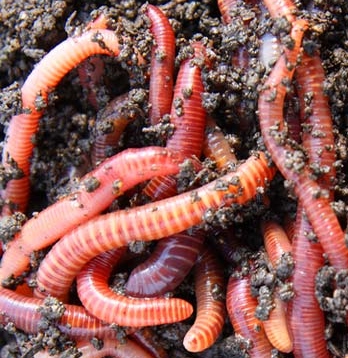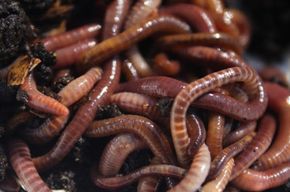Red Wiggler Worms - Reliable Decomposers for Your Compost Container
Red Wiggler Worms - Reliable Decomposers for Your Compost Container
Blog Article
Red Wiggler Worms Demystified: Opening the Keys of Vermiculture for Greener Living and Nutrient-Rich Dirt
In the realm of sustainable techniques for enriching soil quality and advertising eco-conscious living, red wiggler worms play a pivotal yet frequently overlooked role. Red Wiggler Worms. Understanding the intricacies of caring for these worms, maximizing their atmosphere, and using their spreadings can lead to a greener way of life and much healthier dirt for plants to grow.
The Role of Red Wiggler Worms
Red Wiggler worms play an essential function in composting systems by effectively breaking down raw material right into nutrient-rich castings. These ravenous eaters eat a selection of organic materials, such as kitchen area scraps, yard waste, and paper products. As they feed, the worms' gastrointestinal procedures damage down the raw material into a penalty, dark, and nutrient-dense product called worm castings or vermicompost.
The castings created by Red Wiggler worms are very valuable for soil wellness and plant development. They are rich in important nutrients like phosphorus, potassium, and nitrogen, which are crucial for supporting healthy and balanced plant growth. Additionally, worm castings consist of helpful germs and enzymes that assist improve dirt framework, rise water retention, and enhance nutrient uptake by plants.
Benefits of Vermicomposting

It enhances dirt framework, boosts dirt oygenation, and increases soil wetness retention. Vermicompost also improves the soil with necessary nutrients like nitrogen, potassium, and phosphorus, promoting plant growth and total soil fertility.
In addition, vermicomposting assistances lasting horticulture methods by supplying a natural and chemical-free alternative to artificial fertilizers. Red Wiggler Worms. This ecologically pleasant method not only enhances the soil however additionally aids reduce dependence on harmful chemicals, promoting a greener and extra lasting method of horticulture
Establishing a Worm Bin
When establishing a worm container for vermicomposting, proper arrangement is important to make sure the success of the composting process. The very first step in setting up a worm bin is picking a suitable container. This can be a plastic container or wooden box that offers adequate room for the worms to relocate around and has correct water drainage holes to stop waterlogging. Next off, a bed linen material such as shredded paper, cardboard, or coconut coir must be contributed to the container. This bedding supplies a comfy environment for the worms and helps keep moisture degrees.
After adding the bedding, present the red wiggler worms to the container. The worms must then be provided with food scraps such as fruit and vegetable peels, coffee grounds, and eggshells.
Routinely monitor the moisture degrees and temperature in the worm container to make sure optimum problems for the worms. With proper arrangement and maintenance, the worm bin will properly convert organic waste right into nutrient-rich compost navigate to these guys for your plants and garden.
Gathering Worm Castings
To efficiently accumulate nutrient-rich worm spreadings from your vermicomposting system, a methodical harvesting approach is necessary. When it comes time to harvest the worm castings, there are a couple of essential actions to follow to guarantee a successful procedure. First of all, stop including fresh food scraps to one side of the worm bin for a number of weeks prior to collecting. This encourages the worms to migrate to the side with fresh bedding and food, making it simpler to scoop out the castings from the other side.

Troubleshooting Common Issues
Determining and addressing typical obstacles that might occur throughout the vermicomposting process is important for preserving a healthy and Discover More Here efficient worm bin. Adding excess food scraps can lead to an accumulation of dampness and level of acidity in the worm bin, possibly damaging the worms. One more problem is undesirable smells emanating from the worm container.
Additionally, if the worm populace is decreasing or the worms show up harmful, it could be as a result of environmental stress factors such as severe temperature levels or pH levels. Monitoring these aspects and making necessary changes is essential for the wellness of the worms. By troubleshooting these common issues immediately, vermicomposters can make sure a successful and smooth vermicomposting process while maintaining a prospering worm population.

Verdict
In verdict, red wiggler worms play a vital function in vermiculture by damaging down natural issue right into nutrient-rich dirt. Setting up a worm bin is vital for effective vermiculture, and harvesting worm spreadings provides important compost for horticulture.
As they feed, the worms' digestive system processes break down the organic matter right into a fine, dark, and nutrient-dense material recognized as worm castings or vermicompost.
The castings created by Red Wiggler worms are very useful for soil health and wellness and plant growth. Adding excess food scraps can lead to an accumulation of wetness and level of acidity in the worm container, possibly hurting the worms.Additionally, if the worm population is decreasing or the worms appear unhealthy, it might be due to ecological stress factors such as severe temperature levels or pH degrees. Establishing up a worm bin is vital for successful vermiculture, and harvesting worm castings provides beneficial compost top article for gardening.
Report this page